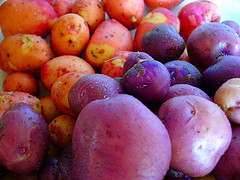
Ian McEwan’s entertaining new novel, Solar, contains one of the best descriptions of a bag of potato chips (or “crisps” to the Brits) that I have ever read:
“It was a plastic foil bag of finely sliced potatoes boiled in oil and dusted in salt, industrialized powdered foodstuffs, preservatives, enhancers, hydrolizing and raising agents, acidity regulators, and coloring. Salt- and vinegar-flavored crisps.”
The novel is actually about a sleazy Nobel-Prize-winning physicist, Michael Beard, who steals a student’s plan to create artificial photosynthesis after the student slips on a polar-bear rug, smashes his head on the side of a glass table, and dies. Anyway, it got me thinking about potatoes, or more specifically one of my favorite scientific papers of all time, “Stages in potato consumption in different stages of life in Norway,” published in 2001 in the journal Appetite by Margareta Wandel and her colleagues at the National Institute for Consumer Research in Oslo.
The aim of the study, wrote Wandel (now at the University of Oslo), was “to contribute to a better understanding of factors promoting the decline in potato consumption in Norway from the mid-1970’s to mid-1990’s.” It seems that young Norwegians living alone were eating fewer boiled potatoes, replacing this staple in their diet with spaghetti, rice and “a large increase in the use of ready-made deep-fried potato products.”
Boiled potatoes prepared with meat or fish, vegetables and gravy are central elements in Norwegians’ notions of a “proper meal,” a dear and trusted friend on [their] dinner plates – so much so, in fact, that an organization called “The Friends of the Potato,” exists to promote the humble tubers. The 40 percent decline in boiled potato consumption is of particular concern to Wandel, as she wrote to me in an email, “firstly because the switch from boiled to fried/deep fried potatoes adds more fat to the diet,” with implications for obesity and heart disease, and secondly because traditionally boiled potatoes are good sources of vitamin C in the Norwegian diet.
So I was pleased to read on Planet Ark that smallholders in a very different region of the world, the semi-arid Sahel, have this year produced bumper harvests of potatoes, onions, and tomatoes. That’s due to the introduction of a program called The African Market Garden, “an Israeli initiative to use low pressure drip irrigation to break dependence on rain and boost crops, nutrition and incomes.” Drip irrigation delivers water drop by drop to plants through tiny holes in plastic pipes; according to the International Crops Research Institute for the Semi-Arid Tropics (ICRISAT), the African Market Garden irrigation system “means returns on land, water and labor are multiplied by two, four and six, respectively, when compared with traditional vegetable production systems on the continent.”
Dov Pasternak, who hails from Israel’s Ben Gurion University of the Negev and now heads the Sahel programme for ICRISAT, says the shift to drip irrigation could allow countries like Niger be transformed from “perennial sites of hunger” into producers of food for the regional market of around 250 million people. Thanks to the initiative, farmers like Yamar Diop, a 73-year-old Senegalese father of ten, will earn about $1,624 over the course of the year. “With the watering cans, we couldn’t do more than one harvest per year. With this innovation, we can do as many as three, so our earnings are multiplied by three,” Diop says.
Photo courtesy of Free Range Life
Great description of crisps(UK).
Intersting that here in the Uk there was a debate not so long ago inititiated by the European Union regarding chocolate bars.
The EU were saying that they should be called by a similar verbally truthful yet long winded name(can’t recall what precisely).
The bars were not actually chocolate or had enough cocoa solids in them to be classed as chocolate.
Cadburys, Nestle, Mars et al were having kittens at the time in the UK. I reckon it would have had a massive impact on their sales.
Don’t know why the issue died a death, but it seems to have gone a way for now.
When we were kids on the farm, we had potatoes two times a day, every day.
I still don’t mind them, but I have friends that can’t even look at potatoes since their childhood years.
While it doesn’t always fit into low carb diets, its certainly is something that can be incorporated into a lot of different regional diets around the globe
Dear Taylor,
If you like eating potatoes you may also enjoy my October 4, 2010 Last Word on Nothing post, “Spuds, Spuds, Glorious Spuds,” about a project by a chap from the Washington State Potato Commission who decided to eat nothing but potatoes and potato products for 60 days. See https://www.lastwordonnothing.com/2010/10/04/spuds-spuds-glorious-spuds/